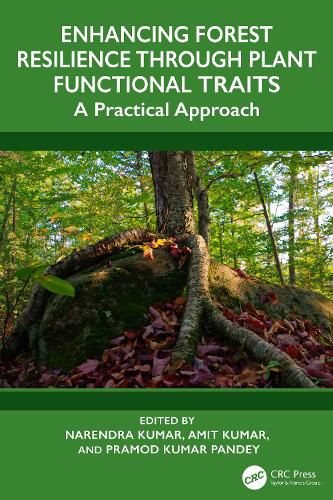Readings Newsletter
Become a Readings Member to make your shopping experience even easier.
Sign in or sign up for free!
You’re not far away from qualifying for FREE standard shipping within Australia
You’ve qualified for FREE standard shipping within Australia
The cart is loading…






This book explores the relationship between plant functional traits and the resilience of forest ecosystems. Understanding how these traits influence forest ecosystems has significant implications for conservation, forestry, and ecosystem management. This book explores the intersection of ecology, botany, and forestry, providing a comprehensive guide to using plant functional traits as a tool to advance sustainable forest development as sustainable forest management becomes increasingly important in the face of global environmental challenges.This book also discusses the role that plant functional traits play in ecosystem dynamics and how they support forest resilience. It emphasizes how crucial these characteristics are for dealing with environmental stresses like drought and climate change, as well as how they affect soil interactions, carbon sequestration, and nutrient cycling. By integrating contemporary developments in trait-based research and analytical instruments, this book provides useful tactics for improving forest resilience via sustainable management techniques.
Key Features:
? A comprehensive overview of the latest advancements in plant functional traits and their role in forest resilience.
? Detailed explanations of the anatomical, physiological, and genetic aspects of plant functional traits, emphasizing their importance in tree growth and adaptation.
? Insights into how functional traits influence nutrient cycling, carbon sequestration, soil interactions, and responses to environmental stressors like drought and climate change.
? Discussion of modern tools and methodologies in trait-based research, along with future directions for integrating functional traits into forest management strategies.
? Practical applications of functional traits in conservation, biodiversity management, and sustainable forest management to enhance ecosystem resilience.
This book serves as a valuable reference for researchers and academicians studying species composition within forest ecosystems and exploring ways to enhance forest resilience in the context of climate change. It is also suitable as a textbook for graduate, postgraduate, and Ph.D. students in fields such as agriculture, botany, plant physiology, forestry, biotechnology, environmental science, and agroforestry.
$9.00 standard shipping within Australia
FREE standard shipping within Australia for orders over $100.00
Express & International shipping calculated at checkout
Stock availability can be subject to change without notice. We recommend calling the shop or contacting our online team to check availability of low stock items. Please see our Shopping Online page for more details.
This book explores the relationship between plant functional traits and the resilience of forest ecosystems. Understanding how these traits influence forest ecosystems has significant implications for conservation, forestry, and ecosystem management. This book explores the intersection of ecology, botany, and forestry, providing a comprehensive guide to using plant functional traits as a tool to advance sustainable forest development as sustainable forest management becomes increasingly important in the face of global environmental challenges.This book also discusses the role that plant functional traits play in ecosystem dynamics and how they support forest resilience. It emphasizes how crucial these characteristics are for dealing with environmental stresses like drought and climate change, as well as how they affect soil interactions, carbon sequestration, and nutrient cycling. By integrating contemporary developments in trait-based research and analytical instruments, this book provides useful tactics for improving forest resilience via sustainable management techniques.
Key Features:
? A comprehensive overview of the latest advancements in plant functional traits and their role in forest resilience.
? Detailed explanations of the anatomical, physiological, and genetic aspects of plant functional traits, emphasizing their importance in tree growth and adaptation.
? Insights into how functional traits influence nutrient cycling, carbon sequestration, soil interactions, and responses to environmental stressors like drought and climate change.
? Discussion of modern tools and methodologies in trait-based research, along with future directions for integrating functional traits into forest management strategies.
? Practical applications of functional traits in conservation, biodiversity management, and sustainable forest management to enhance ecosystem resilience.
This book serves as a valuable reference for researchers and academicians studying species composition within forest ecosystems and exploring ways to enhance forest resilience in the context of climate change. It is also suitable as a textbook for graduate, postgraduate, and Ph.D. students in fields such as agriculture, botany, plant physiology, forestry, biotechnology, environmental science, and agroforestry.